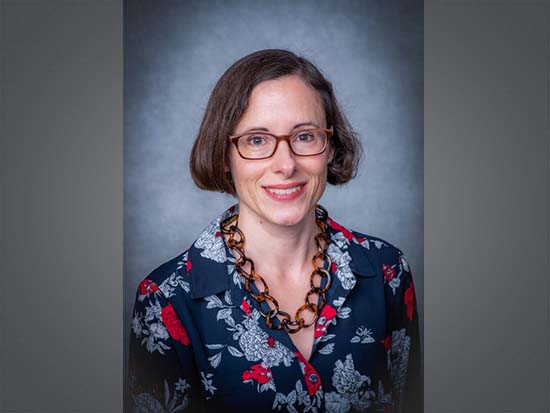Media contact: Adam Pope
University of Alabama at Birmingham Karin Hardiman, M.D., Ph.D.
Karin Hardiman, M.D., Ph.D.
Photography: Nik Layman Division of Gastrointestinal Surgery Associate Professor Karin Hardiman, M.D., Ph.D., has been awarded a National Institutes of Health, National Cancer Institute R01 award in the amount of $1.9 million over five years.
Hardiman’s project, “A novel, transferable sialylation-mediated mechanism of chemoradio resistance in GI cancer,” seeks to improve response to chemoradiotherapy, or CRT, treatment of gastrointestinal cancers. Her lab will oversee the execution of the project.
Although combination chemotherapy with radiation has been the standard of care for treating rectal cancer for more than 20 years, very little is known about why some tumors are more resistant to this treatment than others.
Combination chemoradiation is utilized to treat multiple gastrointestinal cancers, including rectal cancer. Rectal cancer affects 40,000 people per year in the United States. Approximately 85 percent of patients have an incomplete or poor response to treatment, increasing their risk of recurrence.
Hardiman is turning to a new avenue to increasing the effectiveness of CRT for patients with GI cancers: sialylation. She found that rectal cancer cells that harbor the enzyme ST6Gal-1 are more resistant to treatment.
ST6Gal-1 is a Golgi glycosyltransferase that adds the negatively charged sugar, sialic acid, to specific proteins destined for the cell surface. Sialic acid can have profound effects on the structure and function of proteins.
Hardiman’s grant will allow her to study the role of this enzyme in resistance in rectal cancer. She recently published a manuscript in the Journal of Biological Chemistry with general surgery resident and first author Mary Smithson, M.D., titled Sialyltransferase ST6GAL-1 mediates resistance to chemoradiation in rectal cancer. This manuscript describes their research supporting the grant.
Hardiman has supported research and education efforts in the UAB Department of Surgery since joining the department in 2019. The overarching goal of her lab’s research is to improve treatment and outcomes for patients with colorectal cancer.
As a colorectal surgeon, Hardiman has firsthand experience with the successes and toxicities of current treatment regimens for patients. Her lab studies how tumor genetics are important in tumor progression and response to therapy. In addition, Hardiman performs clinical and translational studies to try to improve outcomes for cancer survivors.
Recently, Hardiman was named assistant program director for Resident Research in the UAB General Surgery Residency Program in the Marnix E. Heersink School of Medicine and is responsible for facilitating resident research across the program and helping residents to maximize their academic development time. Additionally, she serves as program co-director of the Surgery Undergraduate Research Experience and the associate director for Quality for the O’Neal Comprehensive Cancer Center, Cancer Service Line.
